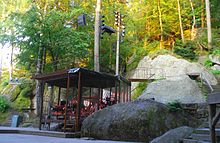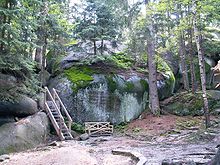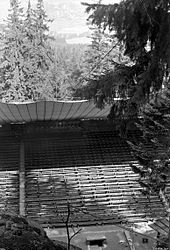Luisenburg Festival
The Luisenburg Festival is a theater festival in Germany's oldest open-air theater . They take place every year in front of the rocky backdrop of the largest rock labyrinth in Europe near the town of Wunsiedel in the Fichtel Mountains , which is also the organizer of the festival.
history
According to tradition from 1665, the Wunsiedler Latin students celebrated their summer festival, the Margarethenfest or Beersingen in front of the rock labyrinth , where self-composed pieces were performed on a large rock slab . Afterwards there was "all sorts of games and permissible entertainment". The high point of the student performances was around 1760, with scenes from everyday life often being presented crudely and clearly and "the vehicle for general cheering". In 1771 she abolished the school administration. Between 1790 and 1805, Wunsiedler dignitaries then performed singspiele and operettas, although things were now more class-conscious. In 1804 today's festival grounds were created.
Because of the good acoustics, song festivals and other club festivals were held almost every year. In 1805 the venue was given its current name in honor of the Prussian Queen Luise . For the 100th anniversary of the opening of Luisenburg wrote Realschullehrer Ludwig Hacker the Festival of Wunsiedel The Losburg that came to the show on July 20, 1890, images from the history and legend of the mountain had to content. The Heimatfestspiel was repeated with interruptions in the following decades, with Wunsiedler citizens and students acting as actors. In 1914, under director Fritz Basil , classical plays with professional actors were staged for the first time, but the festival season had to be broken off on August 1st due to the beginning of the First World War.
It was not until 1924 that the Luisenburg Festival was held again, which ended with a record number of 46,702 visitors in 32 performances. The next year, however, the number of viewers collapsed, which ultimately led to the termination of his contract with Fritz Basil. Those responsible then engaged the united city theater Konstanz-Schaffhausen-Winterthur and were able to show 5 different productions at the Luisenburg. In the years that followed, the Bayerische Landesbühne was responsible for the festival under artistic director Otto Kustermann, who helped the festival to achieve a new audience record in the 1927 season, 57,100 visitors attended the 5 productions. The years before the National Socialists came to power were marked by falling audience numbers and a deteriorating ensemble.
In 1933 Egon Schmid took over the management of the Bavarian State Theater and thus of the Luisenburg Festival, but this was no longer the responsibility of the city of Wunsiedel, but of the superordinate "Reichsbund der Deutschen Freilicht- und Volksschauspiele". During this time a children's play was put on the program for the first time and the "magic mark" of 100,000 spectators was cracked for the first time in 1937. After the 1941 season, the festival had to be closed due to the war and was not resumed until 1951. Nevertheless, the stage benefited in the long term from some renovations that had been implemented under Schmid, for example, investments were made in a new rain cover and a new lighting system.
From 1951 onwards, several seasons were organized by guest performances by the Bavarian State Theater; Deputy General Manager Hermann Wenninger took over the management , before he was inherited three years later by Wolfgang Nufer and in 1956 Friedrich Siems. Siems staged at the Luisenburg until his sudden death in December 1963 and was again able to attract numerous spectators to the Fichtelgebirge. His successor from 1964, Christian Mettin, carried out a major renovation in the spectator area in 1969/1970, so the seats were now arranged as in an amphitheater and were made up of a tent roof construction by Frei Otto , who a few years later also designed the curved roofs of the Munich Olympic site was responsible, protected from rain. During his artistic directorship, Mettin placed a strong focus on Bavarian folk plays, for which he was able to win over numerous well-known actors such as Beppo Brem , Gustl Bayrhammer and Willy Harlander . Mettin's successor as artistic director was Hans-Joachim Heyse in 1979 , who held office in Wunsiedel until 1984 and continued the success story of the festival with many well-known actors such as Uwe Friedrichsen and Toni Berger . Under his directorship, the later director Michael Lerchenberg also appeared on the stage of the Luisenburg for the first time as an actor in 1980.
From 1985 to 1999 Hans Peter Doll then directed the Luisenburg Festival and increased the average number of spectators to around 130,000 spectators per year. He introduced the introductory evenings for the respective productions and tried to establish stronger links with the population of the city of Wunsiedel. After Hans Peter Doll's death in 1999, Pavel Fieber became the new director.
Fieber had already been on the stage of the Luisenburg as an actor and had already staged several times in Wunsiedel. He bet on an ambitious game plan, which ultimately culminated in a drop in audience numbers. In 2002 he fell below the 100,000 audience mark, whereupon his contract with the city of Wunsiedel was dissolved and he had to vacate his post after the 2003 season.
He was succeeded in 2004 by Michael Lerchenberg , who was already familiar with the Luisenburg as an actor. Lerchenberg introduced the now extremely successful musical division at the Luisenburg and in turn was able to win many well-known actors, for example Rosel Zech , for the Luisenburg. During Lerchenberg's directorship, the next major renovation took place between 2010 and 2013, the stage building was massively enlarged, the auditorium and the tent roof were renewed, and major investments were made in the lighting and sound systems.
After 13 years, Lerchenberg left Luisenburg in 2017 after coming into conflict with some local politicians. The successor was a woman for the first time, Birgit Simmler took over the artistic direction of the festival from autumn 2017. Under her leadership, the additional program apart from the classical theater festival was greatly expanded, so she introduced the new series "Luisenburg Late Night", in which the actors of the respective season can perform their often existing solo programs. The concert section will also be expanded significantly from the 2019 season.
Festival today
program
The Luisenburg Festival in Wunsiedel takes place every year between late May / early June and late August / early September. The program consists of a family play, a folk play, a classical play and, since Michael Lerchenberg's artistic director began in 2004, a musical (previously a contemporary piece). The first premiere of the year is usually the children's play, the order of the other premieres varies. After the end of the four in-house productions at the beginning of August, guest performances by the Landesbühnen Sachsen (operas) and the Operettenbühne Wien (operettas) will take place, during the entire season there will also be concerts and performances by cabaret artists on the Luisenburg on days when there are no games.
Under the direction of Pavel Fieber from 2000 to 2003, in addition to the large rock stage, the inner courtyard of the Fichtelgebirgsmuseum in Wunsiedel was established as a smaller venue, the performances here are under the motto "LuisenburgXtra".
The musicals have become real box office hits since they were established on the program in 2004, so the first musical Anatevka (2004) had to be repeated the following year. Later followed u. a. Kiss me Kate (2006), Der Watzmann ruft (2008) (with Wolfgang Ambros ), The Rocky Horror Picture Show (2010), a musical adaptation of the classic film Blues Brothers (2011 and 2012), Cabaret (2015) and Cats (2016 and 2017). In 2018, the first year under the artistic director Birgit Simmler, My Fair Lady will be on view.
The folk plays also have a permanent place in the program and are very popular. The Brandner Kaspar and the Eternal Life, for example, was performed many times at the Luisenburg, the first time in 1967 (still being edited by Josef-Maria Lutz) with Beppo Brem as Brandner, then in 1982/83 a. a. with Toni Berger , directed by Heinz Trixner in 1998 and 2009/2010, and in 2015 with Michael Lerchenberg as Boandlkramer. Other popular pieces by Lerchenberg's directorship were Die Geierwally (2005), Zwölfeläuten (2008), Der Holledauer Schimmel (2011), Wast Wohin? (2012) and The Consecration of the Flag (2013). In 2016 The Bartered Grandfather was performed . Michael Altmann took on the last role of his career. The Whitsun Organ by Alois Johannes Lippl followed in 2017 , with Veronika von Quast and Thomas Unger among others . In 2018 Birgit Simmler directed Andreas Hofer - The Freedom of the Eagle by Felix Mitterer .
In 1974, artistic director Christian Mettin introduced a children's play that is still very popular today, great successes in recent years were, for example, Meister Eder and his Pumuckl from 2011 and a new version of The Jungle Book directed by Simon Eichenberger in 2018. Adaptations of the books by Otfried Preußler and Astrid Lindgren made it onto the program particularly often, for example Preussler's robber Hotzenplotz alone has been brought to the rock stage four times since 1975 and Lindgren's Pippi Longstocking was also shown in three productions at the Luisenburg.
In the classical pieces, William Shakespeare's Midsummer Night's Dream was played particularly often; the piece was first on the program in 1914 and has since been performed over 5 more times due to the parallels in content with the history of the Luisenburg, most recently in the anniversary season of 2015. Other classical pieces such as Nathan the Wise , Faust , Hamlet , Romeo and Juliet and Iphigenie on Tauris have been performed at the Luisenburg over the years. 2016 saw dance theater for the first time at the Luisenburg, Eva-Maria Thöny, the wife of the artistic director Michael Lerchenberg, staged Lorca's blood wedding as a combination of classical spoken theater and dance theater. In 2017 Thomas Bernhard's theater maker was performed, with this play, director Michael Lerchenberg bid farewell to the Luisenburg.
Wunsiedel is one of the ten German festival venues.
Visitor numbers
In 1937 more than 100,000 visitors were counted at the Luisenburg for the first time, the mark was also broken in 1964, 1967 and 1969, since 1971 fewer than 100,000 visitors have been counted in only two summers, most recently in 2002. In the 1977 season, over 142,000 visitors visited the 4th In-house productions of the festival, a record that is still unbroken today. Although the audience numbers in 2010 and 2011 were 148,000 and 151,000 respectively above the number in 1977, there are now also opera guest performances and concerts at the Luisenburg. Under Artistic Director Michael Lerchenberg, the average number of visitors per season could be increased significantly and is now almost 140,000.
Actors at the Luisenburg
Since 1924, the roles at the Luisenburg have mainly been cast by professional actors. An overview of some well-known actors:
Gustl Bayrhammer , Willy Harlander , Beppo Brem , Rosel Zech , Katy Karrenbauer , Toni Berger , Rüdiger Joswig , Claudia Wenzel , Norbert Heckner , Michael Altmann , Michael Lerchenberg , Gerd Silberbauer , Thomas Unger , Maxl Graf , Norbert Neugirg , Rolf Castell , Rudolf Waldemar Brem , Dieter Fischer , Jürgen Fischer , Hartwig Rudolz , Wolfgang Ambros , Anna Montanaro , Veronika von Quast , Michael Vogtmann , April Hailer , Andreas Bittl , Udo Thomer , Michael Boettge , Maria Kempken and Kathrin Ackermann .
Directors
- Egon Schmidt (1934-1941)
- Friedrich Siems (1956–1963)
- Christian Mettin (1964–1978)
- Hans-Joachim Heyse (1979–1984)
- Hans Peter Doll (1985–1999)
- Pavel Fieber (2000-2003)
- Michael Lerchenberg (2004-2017)
- Birgit Simmler has been the festival's artistic director since autumn 2017 .
Rock labyrinth
The rock labyrinth borders directly on the rock stage . A hillside location with rocks and vegetation also forms part of the backdrop.
Young Prize Winner
REHAU AG's 2016 Luisenburg Young Talent Award winner: Marc Schöttner
Luisenburg young talent 2016 of the festival city of Wunsiedel: Fabian-Joubert Gallmeister
2015 REHAU AG Luisenburg Young Talent Prize Winner: Lukas Schrenk
2015 Luisenburg Young Talent Prize Winner of the Festival City of Wunsiedel: Katherina Sattler
Luisenburg Young Talent Prize Winner 2014 from REHAU AG: William Danne
Luisenburg young talent 2014 of the festival city of Wunsiedel: Pirmin Sedlmeier
2013 REHAU AG Luisenburg Young Talent Prize winner: Simone Bartzick
2013 Luisenburg Young Talent Prize Winner of the Festival City of Wunsiedel: Sebastian M. Winkler
Luisenburg Young Talent Prize Winner 2012 from REHAU AG: Moritz Katzmair
Luisenburg young talent 2012 winner of the festival city of Wunsiedel: Hanna Plaß
Luisenburg Young Talent Prize Winner of REHAU AG 2011: Andreas Birkner
Luisenburg Young Talent Prize Winner of the Festival City of Wunsiedel 2011: Ina Meling
Winner of the 2010 REHAU Young Talent Award: Johann Anzenberger
Winner of the Young Talent Award of the Festival City of Wunsiedel 2010: Caroline Hetényi
Laureate Rosenthal Young Talent Award 2009: Bastian Semm
Winner of the Young Talent Award Festival City of Wunsiedel 2009: Barbara Macheiner
Laureate of the Rosenthal Young Talent Award 2008: Konstantin Bühler
Winner of the Young Talent Award of the Festival City of Wunsiedel 2008: Matthias Lehmann
Prize winner Rosenthal Young Talent Award 2007: Elli Wissmüller
Winner of the Young Talent Award of the Festival City of Wunsiedel 2007: Sebastian König
Laureate Rosenthal Young Talent Award 2006: Julia Eder
Winner of the Young Talent Award of the Festival City of Wunsiedel 2006: Stefan Murr
Laureate 2005 Rosenthal Young Talent Award: Jessica Higgins
Winner of the Young Talent Award of the Festival City of Wunsiedel 2005: Michael Pascher
Winner of the 2004 Rosenthal Young Talent Award: Barbara Lucia Bauer
Winner of the Young Talent Award of the Festival City of Wunsiedel 2004: Barbara Romaner
literature
- Wolfgang Daum: For the 100th anniversary of the Luisenburg Festival . In: Der Siebenstern , Vol. 59 (1990), Issue 4, pp. 165-167, ISSN 0949-4685
- Elisabeth Jäger : The Luxburg near Wunsiedel . In: Archive for the History of Upper Franconia , Vol. 41 (1961), ISSN 0066-6335 .
- Christian Mettin: Because the sky is so pleasant and the air so serene. The history of the Luisenburg Festival from the beginning to the present . Upper Franconian Publishing House and Printing House , Hof (Saale) 1980, ISBN 3-921615-33-X .
- Eva-Maria Fischer, Michael Lerchenberg, Holger Stiegler, Bettina Wilts: Theater miracle Luisenburg. Buch & Kunstverlag Oberpfalz, Amberg 2015, ISBN 978-3-95587-018-8 .
- Michael Buselmeier : Wunsiedel . Verlag Wunderhorn, Heidelberg 2011, ISBN 978-3-88423-362-7 . This theatrical novel tells of a young actor who got his first job at the Luisenburg Festival in 1964 and failed miserably with all of his theater and life ideals. Four decades later he visits the sites of the disaster again and not only realizes his shortcomings at the time, but also what treasures remained hidden from him in his bitterness.
Web links
Individual evidence
- ↑ Imprint. (No longer available online.) Official website of the Luisenburg Festival, archived from the original on December 9, 2013 ; Retrieved November 22, 2013 . Info: The archive link was inserted automatically and has not yet been checked. Please check the original and archive link according to the instructions and then remove this notice.
- ^ Luisenburg Late Night. Retrieved February 6, 2019 .
- ↑ Luisenburg Festival 2019, Wunsiedel in the Fichtelgebirge - program, seating plan, price list with tickets / tickets. In: ErlebnisRegion Fichtelgebirge. Retrieved February 6, 2019 .
- ↑ Program 2018 - Luisenburg News. Retrieved on May 31, 2018 (German).
- ↑ LuisenburgXtra 2018 - Luisenburg News. (No longer available online.) Archived from the original on May 17, 2018 ; accessed on May 31, 2018 (German). Info: The archive link was inserted automatically and has not yet been checked. Please check the original and archive link according to the instructions and then remove this notice.
- ↑ My Fair Lady - Luisenburg Current. Retrieved on May 31, 2018 (German).
- ↑ 2017 - Luisenburg News. Retrieved on May 31, 2018 (German).
- ^ Andreas Hofer - The freedom of the eagle - Luisenburg Aktuell. Retrieved on May 31, 2018 (German).
- ↑ The Jungle Book - Luisenburg Current. (No longer available online.) Archived from the original on May 29, 2018 ; accessed on May 31, 2018 (German). Info: The archive link was inserted automatically and has not yet been checked. Please check the original and archive link according to the instructions and then remove this notice.
- ↑ Bayerischer Rundfunk: Luisenburg Festival: Lerchenberg throws down as artistic director | BR.de . August 8, 2016 ( br.de [accessed August 22, 2018]).
- ↑ Birgit Simmler. Retrieved July 9, 2017 .
- ↑ Michael Buselmeier: "Wunsiedel". Review at BooksReviews. November 4, 2011, accessed August 20, 2018 .
Coordinates: 50 ° 0 ′ 42 " N , 11 ° 59 ′ 29" E




